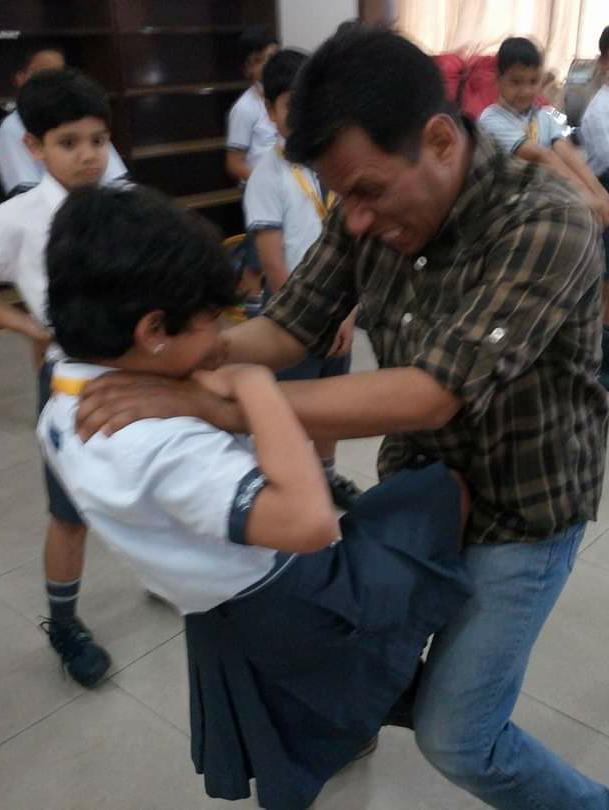Self defense is Defend Yourself
The difference between martial arts & self-defense
Self-defense and martial arts are not the same thing!
Many people think that to learn to protect themselves against everyday dangers they have to learn a martial art — they have to master Michelle Yeoh’s or Jackie Chan’s moves. This simply isn’t true.
While many martial arts did evolve as self-defense systems, they suited the needs of a people in a specific time and place (such as sword-fighting on horseback in 17th century Korea). They don’t translate well to practical, modern-day needs. You’re not, for example, going to do a flying kick to a potential rapist, workplace harasser, or child abuser.
Instead, you can use self-defense techniques for the real dangers women, girls, and LGBTQ+ people face in our society today, such as harassment, abuse, and sexual assault. These are best addressed through a quality empowerment self-defense class.

Self-defense and martial arts each have strengths — and they do have things in common. Here are a few:
SELF-DEFENSE: Anybody can learn basic self-defense skills, even somebody small, elderly, with physical disabilities, overweight, or out of shape. It’s not a form of exercise.
MARTIAL ARTS: Is a good workout. Will get you in shape and bring you the health benefits of fitness. Some schools are geared toward sports and competition and attract younger or more athletic people. Other schools are non-competitive and view martial arts as a practice open to anyone.
BOTH: Get you in touch with your physical power.
SELF-DEFENSE: Teaches skills to use against harassment, abuse, and assault, including everyday situations that don’t involve physical attack.
MARTIAL ARTS: May teach awareness to help with prevention, and may help develop confidence to handle daily situations. The physical fighting techniques of martial arts, though, Martial arts usually practical or realistic for the kind of attacks that happen in today’s world.
BOTH: Increase confidence.
SELF-DEFENSE: Effective skills that can be learned quickly.
MARTIAL ARTS: Must be studied for a long time to attain proficiency; often a life-long pursuit.
BOTH: Create a stronger mind-body connection.
SELF-DEFENSE: Develops self-respect and awareness. Encourages personal insights into experiences with violence.
MARTIAL ARTS: Develops discipline, respect, focus.
BOTH: May spur internal change as well as learning specific skills.
SELF-DEFENSE: Depending on the program, may connect to feminism, anti-racism, and larger social justice issues. Develops a broader awareness of issues related to gender-based violence.
MARTIAL ARTS: Depending on the focus of each school, may encourage spiritual development and/or martial arts as sport and competition.
BOTH: May make connections beyond the particular focus of the program or school.
Sensei Subodha Dhiman good in both Martial arts ( karate do) and self defense ( karate kata bunkai and krav maga) Krav maga is Israeli system of self defense combined with karate, kali, Boxing, jujitsu, kick boxing..
Here is a list of things you need to teach your Child(ren) at early age:
1: Warn your Child Never to sit on anyone’s laps no matter the situation including uncles.
2: Avoid Getting Dressed in front of your child once he/she is 2 years old. Learn to excuse them or yourself.
3. Never allow any adult refer to your child as ‘my wife’ or ‘my husband’
4. Whenever your child goes out to play with friends make sure you look for a way to find out what kind of play they do, because young people now sexually abuse themselves.
5. Never force your child to visit any adult he or she is not comfortable with and also be observant if your child becomes too fond of a particular adult.
6. If a very lively child suddenly becomes awkward you may patiently need to ask the child lots of questions and try to understand this sudden change.
7. Carefully educate your grown ups about the right values of sex . If you don’t, the society will teach them the wrong values.
8: It is always advisable you go through any new Material like cartoons you just bought for them before they start seeing it themselves.
9. Ensure you activate parental controls on your cable networks and advice your friends especially those your child(ren) visit(s) often.
10. Teach your 3 years old children, how to wash their private parts properly and warn them never to allow anyone touch those areas and that
includes you (remember, change begins from home and with you).
11: Blacklist some materials/associates you think could threaten the sanity of your child (this includes music, movies and even friends and families).
12. Let your child(ren) understand the value of standing out of the
crowd.
13: Once your child complains about a particular person, don’t keep quiet about it.
Take up the case and show them you can defend them.
Remember, we are either parents or parents-to-be.
and remember “THE PAIN LASTS A LIFETIME”
